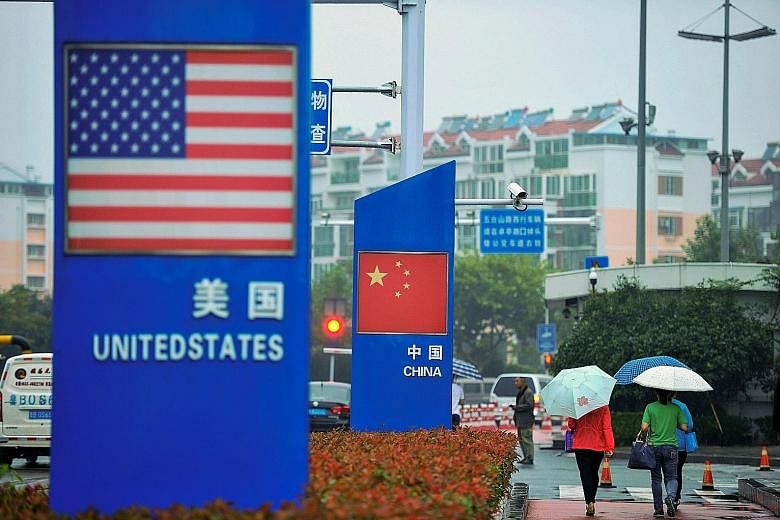PARIS • Global economic growth has peaked in the face of rising trade frictions between the United States and China, and the tensions could well expand into other areas, given the significant "ammunition" the two countries have.
The Organisation for Economic Cooperation and Development (OECD) had forecast in May that the world economy would grow at 3.8 per cent this year and 3.9 per cent next year.
But in an update yesterday, the Paris-based policy forum said that growth has peaked since those last projections were made. The world is now on course for growth of 3.7 per cent this year and next year, up from 3.6 per cent last year, it said.
The OECD added that trade growth, the engine behind the global upswing in recent years, slowed this year to about 3 per cent from 5 per cent last year as tensions between the US and its major trade partners weighed on confidence and investment.
"Export order books have started to decline and that has been going on for a few months and what that means is the deceleration in trade growth will continue," OECD chief economist Laurence Boone said.
"We are seeing the rise of protectionism biting into our outlook," she added.
Even though the US is the source of these trade frictions, the economic outlook for the US was nevertheless the brightest among the OECD's major developed economies, thanks to tax cuts and government spending.
The OECD left its forecast for US growth this year unchanged at 2.9 per cent, but trimmed the forecast for next year to 2.7 per cent, from 2.8 per cent previously.
It said that US import tariffs were beginning to have an impact on the world's biggest economy, estimating that those already imposed would lift overall US prices between 0.3 per cent and 0.4 per cent.
However, the OECD said that a weaker currency had so far helped China - which is not an OECD member - absorb the impact of higher US tariffs, leaving its growth forecasts unchanged at 6.7 per cent for this year and 6.4 per cent for next year.
Rising US interest rates and a stronger greenback caused trouble for emerging market economies such as Argentina, Brazil and Turkey, the OECD also said, slashing its forecasts for those three countries.
However, Ms Boone said the OECD did not expect the difficulties to become a full-blown emerging market crisis, as had occurred in 1998, because countries managed their finances better now.
The second warning came from the World Trade Organisation (WTO), which said the US-China trade dispute could well expand into other areas, given the significant "ammunition" the two countries have.
Speaking at an event in Rio de Janeiro, WTO director-general Roberto Azevedo said the organisation has focused on trying to increase dialogue between the two countries.
"I'm very concerned," he said.
"To be honest, I don't think it's over. They have lots of ammunition and it can expand to other areas beyond just tariffs... and trade." He did not elaborate.
On Tuesday, in the latest sign of deteriorating commercial relations between the world's two largest economies, Beijing added US$60 billion (S$82 billion) worth of American products to its import tariff list in retaliation for US President Donald Trump's planned levies on US$200 billion worth of Chinese goods.
Mr Trump has long railed against the WTO, and his government has eroded its power by blocking appointments to its appeals chamber as existing trade judges' terms end.
If the US manages to paralyse the trade body's dispute settlement system, it would end 23 years of WTO enforcement, the keystone of international efforts to prevent trade protectionism.
Mr Azevedo said it would be possible to have a global trade dispute resolution body without the US, but it is unclear whether Washington would be in favour of such an organisation.
REUTERS

